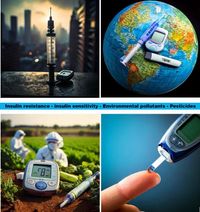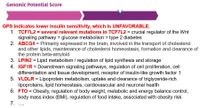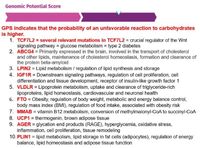Insulin sensitivity - Environmental pollutants - Insulin resistance
Insulin Sensitivity, Environmental Pollutants, and Insulin Resistance: A Growing Health Crisis
The Impact of Environmental Pollutants on Insulin Regulation
The relationship between insulin sensitivity, environmental pollutants, and insulin resistance has become increasingly significant in understanding metabolic health. While genetic predisposition plays a role, external factors — such as toxic exposures, air pollution, pesticides, and endocrine-disrupting chemicals — have now been identified as key contributors to insulin resistance and metabolic disorders.
This case (Own surveys) examines an individual:
- Female, 50 years old, European, urban dweller
- Consistently lean, athletic, and nature-oriented
- BMI of 21.3, non-smoker, no alcohol consumption
- Healthy diet and lifestyle
- Nonetheless, exposed to countless environmental toxins
- Currently diagnosed with MCS, CFS, and EBV reactivation
Despite these ideal health parameters, prolonged exposure to pollutants would have likely resulted in significant insulin resistance, obesity, and Type 2 diabetes —had it not been for stringent preventive measures undertaken in personal responsibility.
A Global Perspective: The Escalation of Obesity and Its Economic Burden
The alarming surge in global obesity rates underscores the urgent need for prevention-based strategies:
- Obesity rates have skyrocketed in recent years, now exceeding 60% in some populations.
- Healthcare costs, lost productivity, and premature retirement related to obesity amount to nearly $2 trillion USD worldwide.
- By 2035, these costs are projected to exceed $4.3 trillion USD.
- In Germany alone, economic losses from obesity surpass $100 billion USD, equating to 2.8% of national GDP. (1)
The Critical Role of Prevention in Type 2 Diabetes
Relying solely on new obesity medications to curb this crisis is unrealistic. Personal responsibility and proactive prevention must be the cornerstone of metabolic health.
Key interventions include:
- Regular physical activity to enhance insulin sensitivity
- Balanced nutrition and avoidance of chronic overconsumption
- Monitoring body weight and maintaining a BMI <25
- Quality sleep, essential for metabolic regulation
- Minimizing periodontal disease risk, as oral inflammation can influence insulin resistance
- Special attention to metabolic health during pregnancy
- Reducing exposure to toxins, pollutants, pesticides, and endocrine-disrupting chemicals — this must be a societal priority, demanding stricter regulations and enforcement.
A Collective Call to Action
Given the overwhelming global burden of insulin resistance and metabolic disorders, every individual must take proactive steps to safeguard their health.
Preventive health measures — lifestyle choices, environmental awareness, and regulatory action — are not optional but imperative in reversing current trends. The cost of inaction is staggering, both for personal well-being and for economies worldwide.
It requires no advanced predictive expertise to recognize that the regulation of the glucose-phosphate metabolic pathway (GPS) of carbohydrates is also significantly affected.
Nutritional Strategies for Optimizing Insulin Sensitivity and Cholesterol Regulation
The Importance of Targeted Carbohydrate and Fat Intake
Maintaining stable blood sugar levels, supporting healthy HDL levels, and minimizing coronary heart disease (CHD) risk requires a scientifically informed dietary approach. Processed carbohydrates, genetic variations, and the interaction between cholesterol and plant sterols play a crucial role in metabolic health.
Nutritional Guidelines for Metabolic Stability
Limit intake of processed carbohydrates
- Reduce consumption of highly refined sugar and flour-based products to prevent blood sugar spikes and insulin resistance.
Prioritize whole, low-glycemic carbohydrates
- Incorporating whole grains, legumes, oats, barley, and apples helps stabilize glucose levels and promote healthy HDL balance.
Restrict refined carbohydrate consumption
- Avoid white bread, processed snacks, and white rice, as they contribute to erratic blood sugar fluctuations and lower HDL levels.
Include healthy fats
- Favor monounsaturated fats and Omega-3 fatty acids, which support cardiovascular health.
Maintain a balanced and diverse diet
- A nutrient-rich diet combining plant-based, fiber-rich, and antioxidant-rich foods enhances metabolic function.
The Role of Cholesterol and Plant Sterols in Gut Absorption
Cholesterol and plant sterols (phytosterols) compete for micellar absorption in the gut. Maintaining a healthy gut microbiome is essential for optimizing sterol metabolism and cholesterol regulation.
Genetic Variations and Their Effects
The accumulation of plant sterols is influenced by genetic factors. Individuals with certain genetic predispositions (e.g., ABDG8 variants) may experience inefficient cholesterol reduction through sterols, potentially increasing coronary heart disease risk.
Personalized Dietary Strategies for Genetic Considerations
Choose whole grains for insulin and cholesterol regulation
- Oats, whole grain products, and quinoa are optimal choices for stable glucose metabolism.
Avoid refined grains
- Eliminating highly processed carbohydrates reduces blood sugar volatility and metabolic disturbances.
Incorporate cholesterol-regulating foods
- Nuts, flaxseeds, chia seeds, almonds, leafy greens, berries, and legumes such as lentils, beans, and chickpeas enhance overall metabolic health.
Evidence-Based Nutrition as the Foundation for Prevention
Addressing blood sugar control, cholesterol metabolism, and genetic predisposition is vital for long-term metabolic well-being. Personalized nutrition can significantly lower the risk of insulin resistance and cardiovascular diseases, making it an integral part of preventive health strategies.
(1) Statistiken zum Thema Übergewicht und Adipositas - Statistics on overweight and obesity, Veröffentlicht von Rainer Radtke, 01.02.2024, statista



